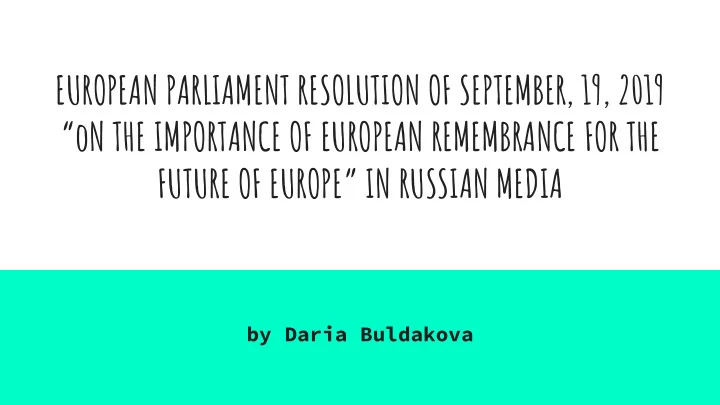

EUROPEAN PARLIAMENT RESOLUTION OF SEPTEMBER, 19, 2019 “oN THE IMPORTANCE OF EUROPEAN REMEMBRANCE FOR THE FUTURE OF EUROPE” IN RUSSIAN MEDIA by Daria Buldakova
Votes of European Parliament’s deputates
Terms of the Resolution that drawed the biggest response in Russian media ● [...]the Second World war [...] was started as an immediate result of the notorious Nazi- Soviet Treaty on Non-Aggression of 23 August 1939 [...]and its secret protocols, whereby two totalitarian regimes that shared the goal of the world conquest divided Europe into two zones of influence;
Terms of the Resolution that drawed the biggest response in Russian media ● [...] the Polish republic was invaded first by Hitler and two weeks later by Stalin [...] the communist Soviet Union started an aggressive war against Finland [...], annexed parts of Romania [...] and annexed the independent republics of Lithuania, Latvia and Estonia;
Terms of the Resolution that drawed the biggest response in Russian media ● [...] despite the fact that on 24 December 1989 the Congress of People’s Deputies of the USSR condemned the signing of the Molotov-Ribbentrop Pact [...], the Russian authorities [...] are currently promoting the view that Poland, the Baltic States and the West are true instigators of WWII;
Terms of the Resolution that drawed the biggest response in Russian media ● [...] Russia remains the greatest victim of communist totalitarianism and its development into a democratic state will be impeded as long as the government, the political elite and political propaganda continue to whitewash communist crimes and glorify the Soviet totalitarian regime.
Articles in Russian media have in common ● their authors declaim against the Resolution; ● the google- search result of “резолюция европарламента от 19 сентября” fully consists of Russian media’s responses to the resolution (apart of Wikipedia’s article, obviously); ● the periodicals where these articles have been published aren’t oppositional to the current Russian regime; ● manipulative techniques are used in each of the articles;
Differences between the articles in Russian media ● length (long and short); ● as a consequence — the level of analyticity; ● presence (or absence) the Russian President’s name in the article;
The President of Russia
The same position the Russian media massively blame the European Parliament in the rewriting of history
Conclusion The discourse about the Resolution (as well as the Resolution itself) is the characteristic of current tension between Russia and the West
Recommend
More recommend